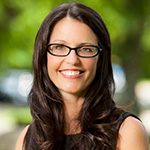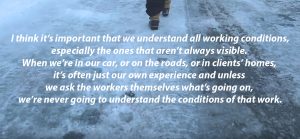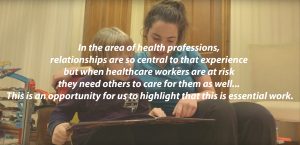
Sheri Price
Dr. Sheri Price is Associate Professor at Dalhousie University’s School of Nursing and part of the team behind this new video on the rewards, risks and realities of providing mobile healthcare.
Recently, Sheri sat down with On the Move to talk about her research and the role of digital media in knowledge dissemination.
Your research has focused on health services, particularly healthcare workers and women’s health. What led you to do to this kind of research?
My research questions were inspired by my practice. I was a research associate in women’s health and I have been a very strong supporter of women’s health initiatives in Halifax looking at issues of homelessness and working with the YWCA. I was also a community health nurse and I travelled with my work. Some of my research was inspired by my roles in women’s health, however my larger program of research has always been specific to health services: how we deliver care, the experience of health professionals and healthcare providers, and the quality of work environments.
When I heard about the On the Move Partnership (OTM), that it was looking at work conditions related to mobility, and that there was a qualitative component, I was really interested in being involved because most of my research has been specific to asking those qualitative questions and trying to get a contextual understanding of what is happening in the workplace. I thought it was a great opportunity to look across sectors and learn from those other groups, because often in the absence of having a body of literature or program of research around an issue, you look to other areas, to other disciplines and across sectors. I thought it was a great opportunity to see what was happening in other areas of work and among other workers who are mobile, because I only had the perspective of nurses. This project was an opportunity to not only look beyond nurses but also beyond health.
Why do you think it’s important to study the experiences of mobile healthcare workers?

My program of research isn’t specific to the mobility of healthcare workers. This is the one project that I am doing in this area. Mostly I am concerned with asking questions about the work that we do, how we work, and how we work in relationship with each other. My focus encompasses healthcare professionals within our own profession, outside our own profession, our clients, and also the healthcare system.
When I think about mobility, I think there is a lot that we do not know, because it is sometimes outside of where we conceive healthcare taking place. I have this personal, experiential knowledge, because I was someone who traveled around in an automobile and went into people’s homes to provide care. I was on the road for many hours, and I think it’s important that we understand all working conditions, especially the ones that aren’t always visible. When we’re in our car, or on the roads, or in clients’ homes, it’s often just our own experience and unless we ask the workers themselves what’s going on, we’re never going to understand the conditions of that work. And when I say conditions I mean both the risks and rewards. Sometimes we think that we are trying to uncover only what isn’t working- the problems, but we also want to highlight why people would want to choose this kind of work.
You’ve produced videos based on your research in the past and are now launching one on mobile healthcare workers. Why do you use digital media as part of your research projects?
I am of the MTV generation, and I think the use of videos to reach people is a very powerful medium. My PhD work looked at millennial students and their career choice experiences, so when you think of millennials and how tech-savvy they are, I started thinking in the context of that group, how am I going to reach them? And what I found is that they really need an updated, contemporary understanding of the careers that they are about to choose and I thought what better way to do that than to create a video? I also thought it was a way to bring my participants stories to life and be responsive to the needs that my research found.
When we completed this On the Move research we stepped back and looked at the findings and one of the things we realized was that there was not a lot of understanding out there on the risks and rewards of mobile healthcare and we asked, who needs to know that? I think employees need to know it, employers, and unions, anyone who is concerned with the working conditions of mobile healthcare workers needs to know our findings. Research papers are not all that accessible and we know that presentations are great, but you are often presenting to other academics at research conferences. It’s something that we as researchers have to do; we have to publish, we have to present, but I believe that we can be a little bit more creative in how we bring our messages to life, and not just to tell the story, but to be responsive to the research. So what our research showed is there is a need to highlight and make visible the risks and rewards of being mobile in healthcare.
Why do you think it’s important to engage the public in academic research?

In the context of healthcare, the public are the recipients of our care, they’re our clients. In the area of health professions, relationships are so central to that experience but when healthcare workers are at risk they need others to care for them as well. I think there’s a real appreciation and understanding for that. This is an opportunity for us to highlight that this is essential work. I think of all the people I visited in their homes and I remember the things they did to make that work for both of us. If we don’t show up to visit a client, that client may not see anybody and they may be at risk and so we need to make sure that doesn’t happen and we need to prioritize the people that maybe are not otherwise going to be seen. When it’s a beautiful sunny day and the roads are clear, there are very few risks but we live in Nova Scotia and the weather can change on a dime and you may find yourself in an unsafe condition and you may have to prioritize who you’re going to see. Some clients may not need a visit that day or could have someone else visit them. Making others aware of these risks is a way to put structures in place so that those who are travelling to care for others are actually safe.
Your research is focused on Nova Scotia but do you think it’s relevant in other parts of Canada?
Absolutely. The risks aren’t specific to Nova Scotia, they’re specific to road conditions. The fact that individuals are often driving in their own vehicles, and there are costs associated with that. We have to make sure that workers are supported to use their own vehicle and are aware that they’ll be driving in their own vehicle. You also look at how lonely it can be on the road and you can be somewhat isolated. We now have the ability to be connected so easily with mobile devices – which is something we can strategize about in terms of using the technology to connect with clients and other care providers. Most of Canada is rural, so when you’re down those long windy country roads and you are rather isolated, that’s not something specific to Nova Scotia, that’s a characteristic of our entire country. I think even learning across sectors is important, some of the strategies that nurses employ are beneficial in terms of healthcare but we can also learn from others. I know that learning about other aspects of OTM and being able to disseminate that across all the sectors, across the country has been insightful – there are so many arms of this study, we can learn by asking – what do other mobile workers do? How do they mitigate some of the risks?
What are the next steps for your research?
My research is focused right now on understanding how we can better learn with, from, and about one another in the context of the health professions. We define that as inter-professional education and collaboration. This project has highlighted the fact that we do not own issues in isolation in healthcare. Sometimes we have to look outside our professional group to find solutions and I love that Barb Neis was able to do that with this study – bring together so many different sectors that have this one shared experience, which is mobility. I think OTM has greatly informed my program of research and I think I will continue to ask the question- “who else might share this problem and who else might share this research question and how might we collaborate to address it”.


Leave a Reply